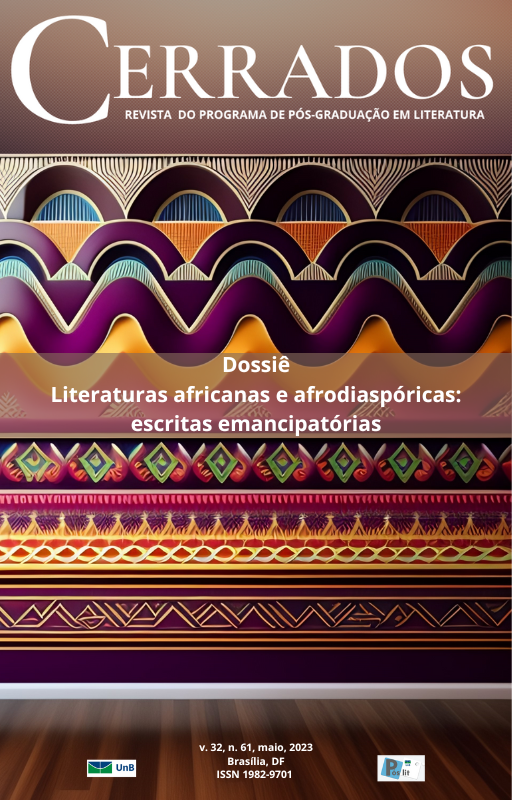Hair and race relations in the construction of a Black female character in Americanah by Chimamanda Adichie
DOI :
https://doi.org/10.26512/cerrados.v32i61.45849Mots-clés :
hair, identity, Female African literature, Chimamanda Adichie.Résumé
The aim of this paper is to investigate how hair in Chimamanda Adichie’s construction of Ifemelu, the main character of the novel Americanah, might be faced as a strategy to question and escape the White norm that has been imposed on Black people as both a beauty standard and a way of living. It demonstrates the complicated racial relations in the novel and establishes the meaning of Ifemelu’s discovery of race and its consequences in her practical life, in her experiences, and her relationship with her body – especially her hair – and herself.
Références
ADICHIE, Chimamanda Ngozi. Americanah. New York: Anchor, 2013.
BANKHEAD, T.; JOHNSON, T. A. Hair it is: examining the experiences of Black women with natural hair. Open Journal of Social Sciences, v. 2, p. 86-100, 2014. Available at: http://dx.doi.org/10.4236/jss.2014.21010. Access on: 25 Nov. 2020.
BRAGA, Cláudio R. V. A literatura movente de Chimamanda Adichie: pós-colonialidade, descolonização cultural e diáspora. Brasília: Universidade de Brasília, 2019.
CRUZ-GUTIÉRREZ, C. Hair politics in the blogsphere: safe spaces and the politics of self-representation in Chimamanda Adichie’s Americanah. Journal of Postcolonial Writing, v. 55, n. 1, p. 66-79, 2019. Available at: https://doi.org/10.1080/17449855.2018.1462243. Access on: 21 Nov. 2020.
FANON, Frantz. Black skins, white masks. Translated by Charles Lam Markmann. London: Pluto, 2008.
FRIEDMAN, Susan Stanford. Mappings: feminism and the cultural geographies of encounter. New Jersey: Princeton University, 1998.
FRIEDMAN, Susan Stanford. The “new migration”: clashes, connections, and diasporic women’s writing. Contemporary women’s writing, v. 3, n. 1, p. 6-27, Jun. 2009.
HALL, Stuart. A identidade cultural na pós-modernidade. Tradução Tomaz Tadeu da Silva e Guacira Lopes Louro. Rio de Janeiro: DP&A, 2001.
HOOKS, bell. Black looks: race and representation. Boston: South End, 1992.
JONES, Charisse; SHORTER-GOODEN, Kumea. Shifting: the double lives of Black women in America. Harper Collings e-books, 2003.
KILOMBA, Grada. Plantation memories: episodes of everyday racism. 2nd ed. Münster: UnrastVerlag, 2010.
LOOMBA, Ania. Colonialism/postcolonialism. New York: Routledge, 1998.
MAMI, F. De-stereotyping African realities through social media in Chimamanda Ngozi Adichie’s Americanah and Belkacem Meghzouchene’s Sophia in the white city. Postcolonial interventions, v. 2, n. 2, p. 162-197, Jun., 2017.
McCLINTOCK, Anne. Imperial leather: race, gender and sexuality in the colonial contest. New York: Routledge, 1995.
McDOWELL, Linda. Gender, identity & place: understanding feminist geographies. Minneapolis: University of Minnesota, 2003.
OYEWÙMÍ, Oyèrónké. Alice in motherland: reading Alice Walker on Africa and screeing the color ‘Black’. In: OYEWÙMÍ, Oyèrónké. (org.) African women and feminism: reflecting on the politics of sisterhood. New Jersey: Africa World, 2003, p. 159-186.
OYEWÚMÍ, Oyèrónké. The invention of women: making an African sense of Western gender discourses. Minneapolis: university of Minnesota, 1997.
Téléchargements
Publié
Numéro
Rubrique
Licence
© Revista Cerrados 2023

Cette œuvre est sous licence Creative Commons Attribution 4.0 International.
Déclaration des droits d’auteur
Aucun élément de cette publication ne peut être reproduite, conservée dans un système de recherche ou transmise, sous quelque forme ou par quelque moyen que ce soit, électronique, mécanique, y compris par un procédé xérographique, sans l'autorisation écrite expresse de l'éditeur. (Lei n. 9.610 de 19/2/1998 )



